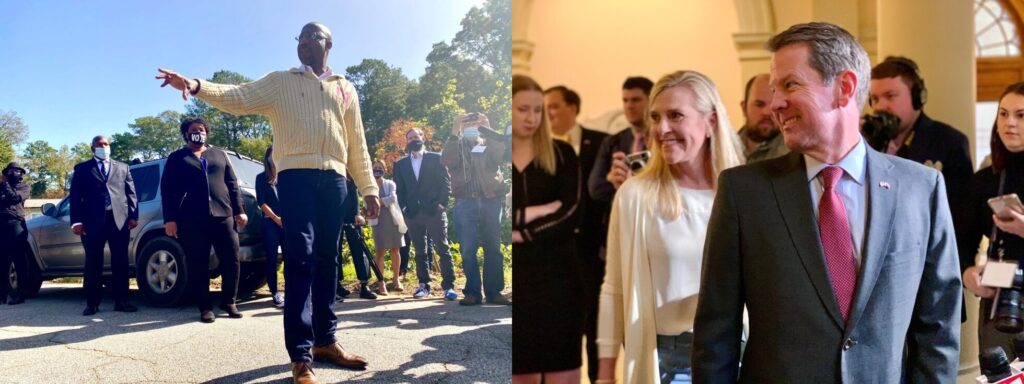
Controversial changes to Georgia’s voting laws are quickly taking center stage in the upcoming 2022 elections as Democratic U.S. Sen. Raphael Warnock and Republican Gov. Brian Kemp look to defend their seats.
Warnock, the senior pastor of Atlanta’s Ebenezer Baptist Church who won a historic runoff in January, said Sunday the country is “at an inflection point” with GOP lawmakers in many states including Georgia pushing bills that Democrats have labeled voter suppression.
Meanwhile, Republicans including Kemp have loudly backed Georgia’s recently passed bill overhauling mail-in and early voting as a move to bolster election integrity after the 2020 cycle saw Democrats win the state’s presidential election and both U.S. Senate seats.
The Georgia bill, which Kemp signed last month following party-line approval in the General Assembly, requires tighter absentee voter identification, empowers state officials to take over poor-performing county election boards, expands early-voting weekend hours and bans non-poll workers from handing out food and drinks within 150 feet of voters waiting in line outside precincts.
Warnock, who is seeking election to a full six-year term after defeating Republican then-Sen. Kelly Loeffler, pushed for passing national legislation in Congress called the “For the People Act” allowing voter registration on Election Day, minimum early-voting periods and no-excuse absentee voting.
That legislation would reverse changes Georgia Republicans made to the state’s voting system that prompted Major League Baseball (MLB) to move this year’s All-Star Game from Atlanta to Denver earlier this month.
“Let’s be very clear: They’re trying to restrict voting,” Warnock said in an online talk held Sunday by the Union Theological Seminary. “Some people don’t want some people to vote.
“You will see me very much engaged on this issue in the next several weeks because nothing less than our democracy is at stake.”
Republicans have slammed the proposed national voting-rights legislation as federal overreach into states’ authority to set election rules that would give Democratic incumbents and candidates an advantage in future elections.
They have also scorched MLB’s decision to ditch Atlanta for the All-Star game, arguing misinformation from Democrats about Georgia’s election bill sparked the move, which will damage local businesses relying on the game’s economic boost.
“The last thing we need is to be playing politics with people’s paychecks during a global pandemic,” Kemp said in recent Twitter comments about the All-Star Game. “Unfortunately, minority-owned businesses will be among the hardest hit by MLB’s decision to pull the game out of Atlanta.”
Kemp, who is seeking a second term in 2022, has given dozens of interviews on the All-Star issue and voting bill in recent weeks as he aims to shore up rifts in the state Republican Party due to election-fraud claims from former President Donald Trump, who narrowly lost Georgia.
Kemp’s refusal to intervene more in certifying the 2020 presidential election results drew official censures from several local GOP branches over the weekend including in Lowndes, DeKalb, Appling and Jasper counties.
Warnock and Kemp both face tough reelection campaigns in 2022, which is already assembling an early field of candidates.
Two Republican challengers have lined up so far against Warnock including Latham Saddler, an Atlanta banking executive and U.S. Navy SEAL veteran, and Kelvin King, an Atlanta small-business owner in construction and U.S. Air Force veteran.
U.S. Rep. Buddy Carter of Savannah is also considering a run against Warnock. Carter told Athens-based radio station WGAU last week he is doing “due diligence” before making deciding whether to campaign.
Kemp has drawn two primary challengers ahead of a likely rematch against 2020 Democratic opponent Stacey Abrams. Former Democratic state lawmaker Vernon Jones, who is among Trump’s most vocal allies in Georgia, and Appling County educator Kandiss Taylor have launched campaigns for governor.